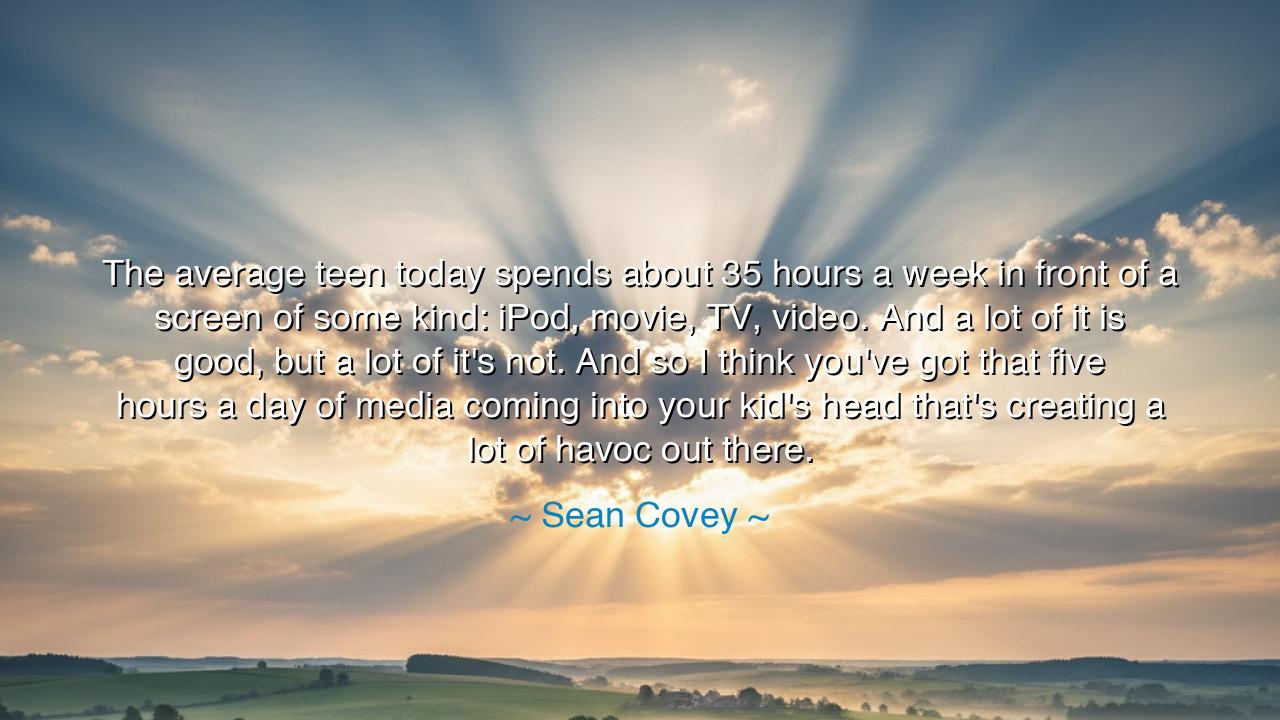
The average teen today spends about 35 hours a week in front of
The average teen today spends about 35 hours a week in front of a screen of some kind: iPod, movie, TV, video. And a lot of it is good, but a lot of it's not. And so I think you've got that five hours a day of media coming into your kid's head that's creating a lot of havoc out there.






When Sean Covey declared, “The average teen today spends about 35 hours a week in front of a screen of some kind: iPod, movie, TV, video. And a lot of it is good, but a lot of it's not. And so I think you've got that five hours a day of media coming into your kid's head that's creating a lot of havoc out there,” he was sounding a warning in the language of our times. His words reveal both the promise and peril of media, that vast flood of images, sounds, and voices that enters the minds of the young. The measure he gives—35 hours a week—is not merely a statistic, but a symbol of how modern youth live more in the glow of screens than in the light of the sun.
The origin of this reflection comes from Covey’s lifelong dedication to teaching principles of leadership and self-mastery, especially to young people. As the son of Stephen R. Covey, the great author of The 7 Habits of Highly Effective People, Sean inherited the mission of guiding the rising generation. He saw that the screens of modern life were both teacher and deceiver—bringing inspiration, education, and connection, yet also pouring forth distraction, confusion, and even despair. His words arise from this dual vision: that the tool itself is not evil, but its unmeasured use brings havoc to the soul.
History shows us that every age has wrestled with such floods of influence. When Rome became an empire, the people filled the coliseums daily, consuming the spectacle of games, chariot races, and bloodshed. Many philosophers lamented that such constant exposure dulled the virtues of discipline, turning citizens into passive seekers of entertainment. In the same way, today’s endless stream of media threatens to overwhelm the attention of youth, shaping their desires not through reflection, but through repetition. What the Romans found in the arena, the modern teen finds in the glowing screen.
Covey’s warning is not a call to abolish these devices, but to bring balance. He acknowledges that “a lot of it is good”—educational programs, music that inspires, stories that uplift. Yet he warns that unchecked consumption, five hours each day, allows messages of violence, vanity, and triviality to slip unfiltered into the young mind. The danger is not only what is seen, but what is left unseen: the neglected friendships, the forgotten books, the abandoned moments of silence and reflection. Thus, the havoc he names is not only in behavior but in the shaping of the heart itself.
The deeper meaning here is that the human soul becomes what it consumes. Just as a body grows strong on nourishing food or sickly on poison, the mind and spirit reflect the quality of what enters them daily. If screens supply endless distraction, then distraction becomes the habit of the soul. But if the mind is fed with truth, beauty, and wisdom, it becomes resilient, focused, and creative. Covey calls us to recognize that five hours a day is not a neutral flood—it is a force shaping the very destiny of the next generation.
The lesson for us is urgent: be mindful of what you allow into your mind and the minds of your children. Do not leave the gates unguarded, for whatever enters repeatedly will build the walls of character—or weaken them. Teach discipline not by denial alone, but by substitution: replace hours of noise with time in nature, with reading, with conversation, with silence. Balance the glowing screen with the glowing fire of real life—family, service, and purpose.
Practical wisdom flows from this: set boundaries around media, and do so with intention. Count the hours not to banish joy, but to restore balance. Ask yourself, What seeds are being sown by what I watch, hear, and consume? Encourage young people to become not mere consumers of media, but creators—to use the tools for building, not only for distraction. In this way, the flood of influence can be transformed from havoc into harmony.
Thus let Sean Covey’s words be remembered: screens may fill the eyes, but they must not empty the soul. Five hours a day can either be chains or wings. It is for us, the elders and the youth alike, to decide whether the time we give to media will create ruin or wisdom. For as it has ever been, what the mind feeds upon, the heart becomes.






AAdministratorAdministrator
Welcome, honored guests. Please leave a comment, we will respond soon